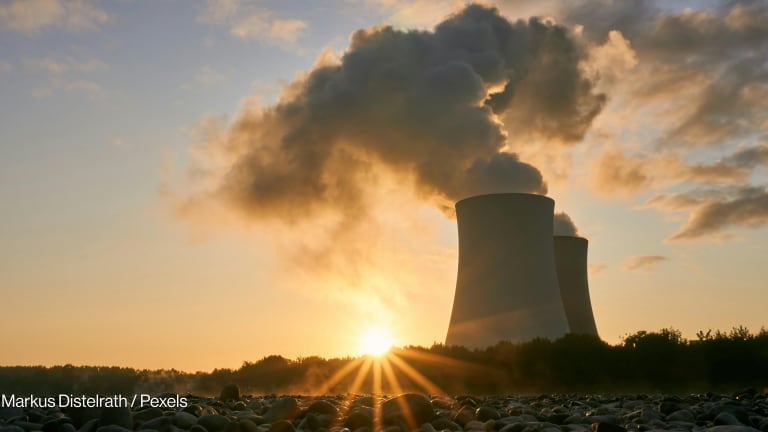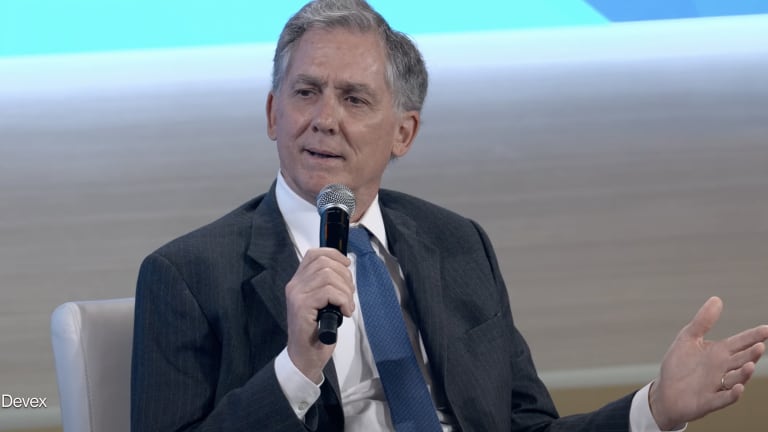
WASHINGTON — U.S. President Donald Trump’s nomination of David Malpass to be the next president of the World Bank has left many wondering what it might mean for the institution to be led by someone who shares the Trump administration’s perspective on a range of global issues.
Under Malpass’ potential leadership, how might the bank position itself within the ongoing economic and geopolitical battle between the United States and China, for example?
Will Trump's nominee turn the World Bank against China?
U.S. President Donald Trump nominated David Malpass, a key architect of the administration's ongoing feud with China, to be the next president of the World Bank.
Devex spoke to Yukon Huang, a senior fellow at the Carnegie Endowment for International Peace and former World Bank country director for China, about what kind of power a new president would have to reshape the institution’s approach — and whether he would use that power to advance the Trump administration’s agenda, or the bank’s.
“If you ask me — can the president do what he wants on behalf of the administration? I would say if he actually went down that route, it would create a real problem within the institution,” Huang said.
This interview has been edited for length and clarity.
As a former World Bank country director for China, does it concern you that the Trump administration's nominee has said that it doesn't make sense for the bank to lend to China?
Is something going to change in terms of the bank's approach to China? I would say probably not in the short term, because they've already reached understanding of what that lending program [will] be for the next three or four or five years.
“You could say that the World Bank needs China more than China needs the World Bank.”
— Yukon Huang, former country director for China, World BankThe more interesting issue is — what is the role of the World Bank for countries like China or upper-middle-income countries, and [should the World Bank] continue to lend to such countries, particularly ones which are seemingly creditworthy or financially strong? This is where much of the commentary actually misses the point. In some ways, you could say that the World Bank needs China more than China needs the World Bank.
The bank is a financial institution which remains financially solvent because its lending base and credit base is so strong that it can borrow globally on near U.S. creditworthy terms. That keeps its cost bases very, very attractive, and therefore it can make loans with low interest rates because it borrows at such a low cost.
So how can it borrow at such a low cost — almost the equivalent to America's creditworthiness? Because its lending and financial position is seen as so solid.
For it to be so solid, it means a portion of its lending actually goes to financially very strong countries. People say, "well, gee, why should we be lending to China?" In actual fact, China is doing the World Bank a favor by borrowing, because people realize it's not going to default on those loans.
There’s a key issue that I think has not been resolved. [People] think that development, or lending, or what development actually is, is all about money — money flowing to poor countries. And we know, in fact, that's not the issue, actually. Development is really about the transfer of knowledge, the building of institutions.
So here is the big issue which is now being debated, but people don't realize they're debating it. The whole precept of the World Bank rested on the proposition that developing countries, to grow faster, need to learn from developed countries and they need to strengthen their institutions to be closer in performance with the developed world. And the way that happens is through these long-term projects, so that the knowledge, the experience, the institution-building is transferred.
“[Does the Trump administration] support the transfer of knowledge and strengthening of institutions from rich countries to poor countries? Because that was the purpose of the World Bank ... If it doesn't, then, of course, the whole institution is nonsensical.”
—Then the question is: “Is that relationship ... in harmony with the Trump administration's objectives or not?” And that's a slightly different question.
What is the objective of the Trump administration? Do they support the transfer of knowledge and strengthening of institutions from rich countries to poor countries? Because that was the purpose of the World Bank. That's why it was created. If it doesn't, then, of course, the whole institution is nonsensical. It doesn't make any sense.
The whole assumption has always been that that transfer is good for everybody, that developed countries benefit, developing countries benefit, the world benefits. That is, of course, the discussion of globalization. Is it something that everyone benefits from, or does it only benefit one side or the other?
How will Trump administration concerns about One Belt One Road — and the possibility that China’s lending is driving countries into debt — impact the bank?
The issue of the bank lending to countries which have a debt problem, and what should be the bank's policies, has always been a tricky one. I used to work ... as the World Bank's director for Russia. The U.S. Treasury was putting pressure on the World Bank to lend to Russia so that Russia could repay its loans to creditors. This question of using the bank, or of countries borrowing, can also be seen from an American perspective in America's interest. It depends upon what their interests are.
Will the World Bank push China's Belt and Road Initiative in the right direction?
The World Bank has lent its name to China's massive infrastructure effort, but will it also ask the hard questions?
You're going to see, in the coming years, debt pressures globally, not necessarily from the [Belt and Road Initiative]. The BRI may be part of this, but they will show up elsewhere, because there's a debt problem that's emerging globally, and many developing countries are having problems.
The World Bank, as well the IMF [International Monetary Fund], will run into an issue [in which they will have to decide] — is it in their interest to lend money to some of these countries with a debt problem, and will this be supported by the administration or not?
If American banks and creditors are feeling pressure, in terms of not being repaid, then the administration will be very keen on World Bank lending to help these countries out, provided that an agreement is reached ... so that financially this problem can be solved.
The BRI initiative is of a similar nature. BRI could create more debt problems, but those debt problems were created long before the BRI existed. BRI just made it a little bit worse. When people say that the BRI created debt problems, that's not correct. Usually, that country had a debt problem beforehand, and BRI is making it worse. Then you have an issue.
What do you do with a country that has a debt problem, and that problem is being created by a variety of past borrowing, long before the BRI was a significant factor? Will America be interested in supporting either bank lending or IMF lending?
“America's power, security weapon, is the financial system which it controls.”
—I think the answer will be, they probably have to find a way of doing it, because in the end ... the financial system is America. America always goes for a solution which strengthens the global financial system, because that's America's strength. The global financial system is essentially America's financial system.
So in other words, "America first" is "global financial system first."
Yes, because that's America's supreme control over the world. It's not their H bombs ... America's power, security weapon, is the financial system which it controls. And if that system functions, it gives them universal leverage and sanction authority that no other country has.
America has a stronger interest than most in trying to ensure that these kinds of debt problems and crises get resolved, and they end up always using the World Bank and IMF in a way that supports that process.
What degree of power and policy leverage does the World Bank president have over these issues that we've discussed?
More on the World Bank:
► As Jim Kim steps down, a tumultuous World Bank presidency comes to an end
Some people would say that the power does not rest with the American president, it rests with the U.S. [executive director] on the board, because the U.S. ED represents America's interests. The president is supposed to represent the interests of the institution ... rather than the interest of America. Therefore, when you come down to a really contentious issue, the critical voice will be the American ED who liaises with the U.S. Treasury head and, in turn, the administration.
Now, you could argue in this process, “well doesn't the American president [of the World Bank] interact with the Treasury and the [U.S.] president’” And the answer is possibly, but quite often he doesn't.
He doesn't because if he did, and the board felt that he was operating on behalf of the administration directly, they would find that troublesome. They would say that's not appropriate. That's the role of the American U.S. ED on the board. That's why we have an executive director. Otherwise why did we bother?
The World Bank has a very strange structure because of these board members — a sitting set of board members. At corporations, you don't have a sitting board. They come and meet quarterly and biannually, they don't sit there every day of the year.
[That] is precisely because when the World Bank was created, and idea was that the president would be American, the rest of the world, including Europe, [decided that] in order to … offset the fact that the president will [likely] always be American … we must have a board of sitting directors, in some sense governing jointly with the president.
Now that's a very strange governance structure for a financial entity. The [Asian Infrastructure Investment Bank] in Beijing looked at the structure of the World Bank, the [Asian Development Bank], the [European Bank for Reconstruction and Development]. The key difference is they don't have a sitting board of directors. [The reason for] giving up the sitting board of directors was that China actually does not have veto power in the AIIB, and that negated the issue of having a sitting board of directors. But here America does have a veto power, in terms of its 16 percent voting capacity and ability to determine various things. So that's the quid pro quo.
If you ask me — “can the president do what he wants on behalf of the [U.S.] administration?” I would say if he actually went down that route, it would create a real problem within the institution.
That link, in terms of the administration, normally does come and will come through the executive director. Of course, the executive director is speaking with the president. Everyone's speaking to the president. To what extent is the president on board or not on board? Well it's a grayish area.
But formally speaking, I think he would try to avoid the issue of saying, "I'm the direct link to the White House." The U.S. ED is the link to the Treasury and to the White House.








